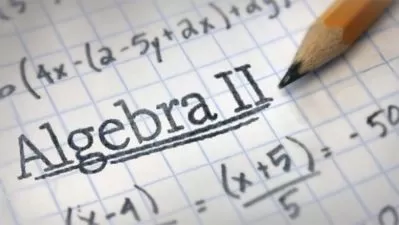About Algebra 2Learn More
Algebra, along with number theory, geometry and analysis, is one of the broadest branches of mathematics. Algebra in its most general state studies these mathematical symbols; And it is the thread that unites almost all mathematics together.
Sort by:
Sorting
The newest
Most visited
Course time
Subtitle
Filtering
Books
Frequently asked questions about Algebra 2
Algebra is a term describing any type of math in which letters take the place of numbers in a formula. For example, x + 2 = 5 is an algebraic formula in which x represents the number 3. Taking this concept further allows you to solve many different kinds of formulas, including calculating the area of a shape. It also lets you quickly perform calculations that would otherwise be complex and lengthy. Algebra is useful in everyday life, giving you the foundation to make sound financial and logical decisions. It’s also the building block for every other higher type of mathematics and other subjects. Whether you are calculating distance or deciding how much paint to buy for your walls, algebra will be the tool of choice.
There are countless careers that rely on algebra. It is absolutely essential for any career as a scientist or engineer, whether it’s chemistry, biology, social sciences, physics, or food science. Computer programming and software engineering, some of the fastest-growing careers today, are heavily reliant on algebra. Algebra is also important for teachers, doctors, and veterinarians. For those interested in technology, algebra is an indispensable tool. New technologies usually have algebra at the base of their functionality. Even careers that don’t directly require using algebra every day will require taking the class in college or high school, meaning it is a prerequisite for those careers. For this reason, it’s safe to assume that algebra is a building block for just about any career out there.
In order to be able to learn algebra, you need to be fluent with basic topics covered in elementary math. This includes arithmetic operations like addition, subtraction, multiplication, and division, as well as an understanding of how fractions work. It is also important to have a solid grasp of non-integer numbers like decimals and percentages, as well as how they’re related to one another. Proportions and ratios are also important in algebra, as is probability. Knowing formulas for basic geometrical shapes also helps: it’s great to enter algebra knowing the formula for the circumference of a circle, the area of a rectangle, perimeters, and other basic formulas. Also, be sure to understand the concept of what an integer is and how the number line works.









